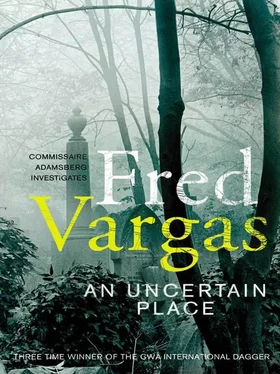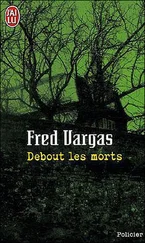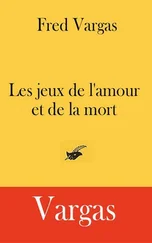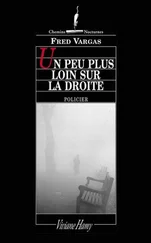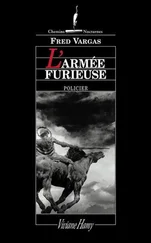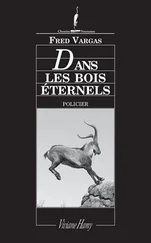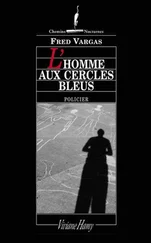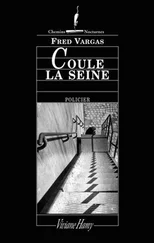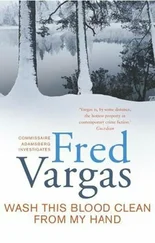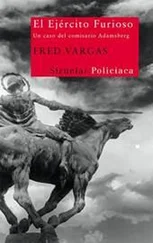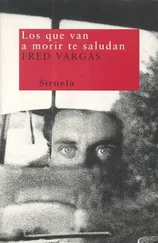‘It’s like a slaughterhouse! Where’s the body?’
‘Everywhere, lieutenant ,’ said Adamsberg, stretching out his arms to encompass the whole room. ‘It’s been chopped up, pulverised, scattered. Wherever you look, you see parts of it, and when you see it all, you can’t see any of it. There’s nothing but the body, but the body isn’t there.’
Retancourt inspected the scene in a more systematic manner. From one end of the room to the other, organic fragments were scattered on the carpets, the walls, in ghastly chunks alongside the legs of the furniture. Bones, flesh, blood, something burnt in the fireplace. A disaggregated body, which did not even arouse disgust, in the sense that it was impossible to associate these elements with anything resembling a human being. The officers were moving around cautiously. Every step carried the risk of touching some unseen piece of the invisible corpse. Justin was talking in a low voice to the photographer – the one with freckles whose name Adamsberg could never remember – and his short blond hair was soaked and clinging to his scalp.
‘Justin’s in shock,’ said Retancourt.
‘Yes,’ said Adamsberg. ‘He was the first to get here, and he’d no idea what he’d find. The gardener had raised the alarm. The duty officer at Garches called his boss, who called us when he realised what they were up against. Then Justin walked right in on it. You should relieve him. Can you co-ordinate the takeover with Mordent, Lamarre and Voisenet? We’ll have to do a spot check, inch by inch, make a grid and collect the remains.’
‘How on earth did he do it? Think how long it must have taken.’
‘At first sight, it looks like he had a chainsaw and a blunt instrument of some kind. Between eleven last night and four this morning. He was able to get on with it because these villas are quite a long way apart, with big gardens and hedges. No very close neighbours and most of them are away for the weekend anyway.’
‘An old man, you say. What do we know about him?’
‘That he lived here, alone, and that he had plenty of money.’
‘Plenty of money, yes,’ agreed Retancourt, looking at the tapestries on the walls, and the baby grand which took up a third of the room. ‘But alone? Surely you don’t get mas sacred like this if you’re really alone in the world.’
‘That’s if it’s him at all, Violette. But we’re nearly certain about that. The hair looks the same as we found in the bathroom and bedroom. So if it was him, his name was Pierre Vaudel, seventy-eight, former journalist, specialised in legal affairs.’
‘Ah.’
‘Yes, but according to the son, he didn’t have any serious enemies. Just a few disputed cases and some vague grudges.’
‘Where’s the son?’
‘On his way by train – he lives in Avignon.’
‘He didn’t say anything else?’
‘Mordent says he didn’t burst into tears.’
Dr Roman, the police pathologist, who had returned to work after a long time off sick, came and stood in front of Adamsberg.
‘No point trying to get the family to identify him. We’ll do it by DNA.’
‘Obviously.’
‘This is the first time I’ve ever seen you sit down on a case. Some reason you’re not standing?’
‘Because I’m sitting, Roman, that’s all I want to do. What would you deduce from this carnage?’
‘Some body parts haven’t been entirely crushed with a heavy implement. There are recognisable sections of thighs, arms, just bashed about a bit. But the murderer took special care to demolish the head, hands and feet. They’re completely shattered. The teeth too. It’s a very thorough job.’
‘Have you ever seen anything like this?’
‘Sometimes you get faces and hands being obliterated to avoid identification. But that’s got much rarer since we have DNA checking. I’ve seen plenty of bodies that’ve been damaged or burnt, and so have you. But such a ferocious way of dismembering the body? No, it’s quite beyond comprehension.’
‘Where does it take us, Roman? Insanity?’
‘Sort of. It’s as if he went on repeating gestures over and over until he could do no more, as if he were afraid of leaving something undone. You know, it’s a bit like when you go back ten times to make sure you’ve locked the door. He didn’t only crush everything, bit by bit, and started again more than once, he chucked the pieces all over the place. No one fragment ended up next to another, even the toes aren’t together. It’s almost as if he was scattering corn in a field. Did he think there was a chance the old man could come to life again, or what? Don’t ask me to try and reassemble the body, it’s impossible.’
‘I agree,’ said Adamsberg. ‘He was out of control, panicking, in some kind of endless rage.’
‘There’s no such thing as an endless rage,’ his colleague, Commandant Mordent, interrupted aggressively.
Adamsberg stood up, shaking his head, and stepped on to a platform, then on to the next, carefully. He was the only one moving. The other officers had stopped to listen, standing still on their own platforms like so many pawns, as a key piece moved on the chessboard.
‘Normally, no, Mordent, but here, yes. This man’s rage, or panic or madness, goes beyond what we can see, taking us into unknown territory.’
‘No,’ the commandant insisted. ‘Rage and anger burn up quickly, then they’re over. This looks like hours of work. Four hours at least, and that’s not the way rage works.’
‘Well, what is it then?’
‘Hard labour, obstinacy, calculation. Maybe even setting up a scene for us.’
‘Impossible, Mordent, nobody could fake this.’ Adamsberg crouched down to look at the floor. ‘He was wearing boots? Big rubber boots?’
‘Yes, that’s what we thought,’ Lamarre confirmed. ‘Looks like a sensible precaution, given what he was going to do. The soles have left some good prints on the carpet. And there are some fragments of stuff from the ridges in the boots, mud or something.’
Mordent murmured ‘hard labour’ again, and stepped diagonally like a bishop, while Adamsberg moved two paces forward and one to the side, accomplishing a knight’s move.
‘What did he use to do the crushing?’ he asked. ‘Even with a heavy club or something, he couldn’t do that on the carpet.’
‘We’ve got a patch on the carpet hardly stained,’ Justin pointed out, ‘a rectangular shape. He might have put something on a block of wood or some metal plate, to act as an anvil.’
‘That’s a lot of heavy equipment to carry around: a chainsaw, a club, a block of wood. Plus spare clothes and shoes.’
‘You could get it all into a big sack. I think he must have changed outside in the back garden. There are some specks of blood on the grass, where he must have put down bloodstained clothes.’
‘And now and again,’ Adamsberg remarked, ‘he sat down for a rest. He chose this armchair.’
Adamsberg looked at the chair, its carved arms and its pink velvet seat now stained with blood.
‘That’s a very fancy chair,’ he said.
‘That,’ said Mordent, ‘is not just a very fancy chair, it’s Louis XIII, no less. Early seventeenth century.’
‘All right, commandant , it’s Louis XIII,’ said Adamsberg evenly. ‘And if you’re going to nitpick all day, please go home. Nobody wants to work on a Sunday, and nobody likes having to wade through this slaughterhouse. And you’ve had more sleep than some of us.’
Mordent made another bishop’s move, away from Adamsberg. The commissaire clasped his hands behind his back and looked again at the chair. ‘This was the murderer’s refuge, so to speak. He takes a break. Looks around at the destruction he’s causing, but he wants a few moments of relief and satisfaction. Or perhaps he’s just out of breath.’
Читать дальше
